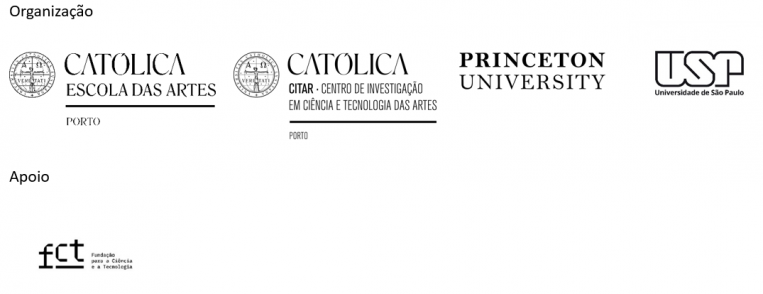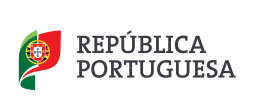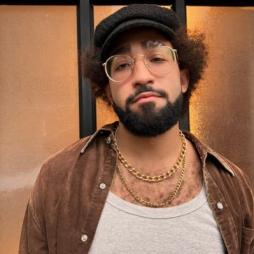
|
ARTUR SANTORO Having obtained his degree in Social Sciences from the University of São Paulo (USP) and currently pursuing a master's degree in Social Anthropology, he is a dedicated researcher of Afro-Brazilian cultures and histories. He has actively contributed to the curation of exhibitions at the São Paulo Assis Chateaubriand Museum of Art (MASP), including the notable Histórias Afro Atlantic (2018). Furthermore, he serves as the director of the 'Batekoo' project, a platform aimed at promoting entertainment, culture, and information tailored to urban, black, and LGBT+ youth. |
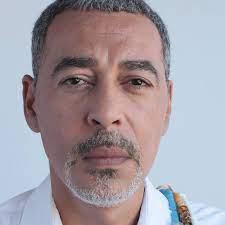
|
AYRSON HERÁCLITO An accomplished visual artist and curator, currently pursuing a PhD in Communication and Semiotics at the Pontifical Catholic University of São Paulo. He also serves as a professor in the Visual Arts course at the Center for Arts, Humanities, and Letters at the Federal University of Recôncavo da Bahia – UFRB. His artistic endeavors span various mediums including painting, drawing, sculpture, photography, audiovisual, installation, and performance, often exploring themes rooted in Afro-Brazilian culture. His works have garnered numerous awards and have been featured in solo exhibitions across Bahia as well as international festivals and biennials. Notably, his art has been showcased at prestigious venues such as the Venice Biennale (57th edition, 2017), the Fowler Museum in Los Angeles, the European Center for Contemporary Art in Belgium, Malba in Argentina, the Kunst Film Biennial in Germany, the II Luanda Triennale in Angola, the 2nd Changjiang International Photography and Video Biennial in China, the Weltkulturen Museum in Germany, and two Mercosul Biennials in Brazil. In Brazil, his works have been displayed in esteemed exhibition spaces including the Rio Art Museum (MAR/RJ), Associação Cultural Videobrasil (SP), Pinacoteca do Estado de São Paulo (SP), Museu de Contemporary Art (MAC, RJ), Escola de Artes Visuais do Parque Lage (RJ), Museu de Arte Moderna da Bahia (BA), SESC Pompeia (SP), Museu da Cidade (OCA, SP), and Centro Cultural Banco do Brasil (CCBB, BSB). Several of his pieces are held in the collections of prominent museums and institutions worldwide, including the Itaú Cultural Collection (São Paulo, Brazil), The Inhotim Institute (Brumadinho, Minas Gerais), the Museum der Weltkulturen (Frankfurt, Germany), the Rio Art Museum (Rio de Janeiro, Brazil), the Pinacoteca do Estado de São Paulo (São Paulo, Brazil), the São Paulo Assis Chateaubriand Museum of Art (São Paulo, Brazil), the Raw Material Company (Dakar, Senegal), and the Museu de Arte Moderna da Bahia (Salvador, Brazil). |
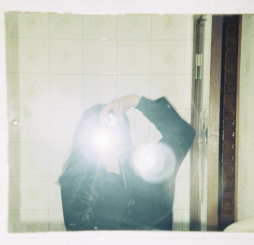
|
CARLA FILIPE Carla Filipe's artistic practice is characterized by the appropriation of objects and documents, as well as the exploration of the fluid relationship between art, popular culture, and activism. Utilizing materials such as flags, posters, newspapers, and railway artifacts, she constructs her work. Her journey in the art world commenced in Porto in 2001, where she became involved in artist-run spaces, co-founding the "Salão Olímpico" and the "Project Appendix". In 2009, she was awarded a scholarship from the Calouste Gulbenkian Foundation for an artistic residency at ACME Studios in the UK, marking a significant turning point in her national and international recognition. Since then, her work has been featured in notable exhibitions and biennials worldwide, including the Biennale Manifesta 8 “Dialogue between the region of Murcia and North Africa” curated by Tranzit.org in Murcia, Spain (2010); EDP Awards - New artists, curated by João Pinharanda, Nuno Crespo, Delfim Sardo, Lisbon, Portugal (2011); V Bienal de Jafre, curated by Carolina Grau and Mário Flecha, Jafre, Spain (2011); "Deaf / Dumb Archive", curated by Zbyněk Baladrán, Tranzit.Display, Czech Republic, Prague (2011); "Mon, am i barbarian?", curated by Fulya Erdemci, 13th Istanbul Biennale, Turkey (2013); "from tail to head" curated by Pedro Lapa, Museu Berardo, Lisbon, Portugal (2014); "Air Traces" curated by Alan Quireyns, Antwerp, Belgium (2014); "12 contemporaries, Present States” curated by Suzanne Cotter and Bruno Marchand, Museu Serralves, Porto, Portugal (2014); Re-Discovery III curated by Ulrich Loock, Autocenter, Berlin, Germany (2015); “Au sud d’aujourd’hui” curated by Miguel Von Hafe Pérez, Calouste Gulbenkian Foundation, Paris, France (2015); Artistic Residency (2015) Robert Rauschenberg Foundation, Captiva, Florida, USA; "Incerteza Viva" curated by Jochen Volz, 32nd Bienal de S.Paulo, Brazil (2016); Incerteza viva: an exhibition from the 32nd Bienal de S. Paulo, curated by João Ribas and Jochen Volz, Museu de Serralves, Porto, Portugal (2017); 4th Ural Industrial Biennial curated by João Ribas, Ural, Russia (2017); and “Ecstatic Sphinx - Drawing and Animism Part II” curated by Nuno Faria, CIAJG, Guimarães, Portugal. Additionally, she curated exhibitions such as those at Galeria Municipal do Porto, Porto, Portugal (2018), alongside Ulrich Loock. |
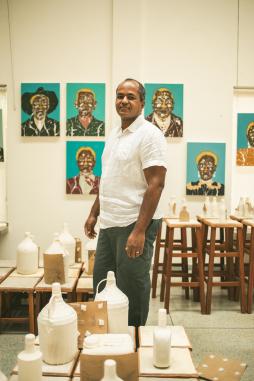
|
DALTON PAULA In recognition of his impactful work, Dalton Paula was honored with the Soros Arts Fellowship Award from the Open Society Foundation in 2023. His notable exhibitions include “Rota do Algodão” at the Pinacoteca de São Paulo and the solo exhibition “Retratos Brasileiros” at MASP in 2022. In 2021, he contributed to the “Enciclopédia Negra” exhibition at the Pinacoteca de São Paulo, while in 2020, his inaugural solo exhibition, “Dalton Paula: the kidnapper of Souls,” was showcased in New York at the Alexander and Bonin Gallery. Further acclaim followed in 2019 when he was named one of the five winners of the 7th edition of the CNI SESI SENAI Marcantonio Vilaça Award for Visual Arts. His works were featured in the “36th Panorama of Brazilian Art: Sertão” at the São Paulo Museum of Modern Art (MAM). Dalton Paula's international presence was highlighted in 2018 when he was selected for the New Museum’s “Songs for Sabotage” Triennial in New York, USA. He also participated in the 11th Mercosul Visual Arts Biennial - “O Triângulo Atlântico” in Porto Alegre, RS, and contributed to the exhibition “Afro-Atlântica Stories” held at MASP and Instituto Tomie Ohtake. In 2017, he showcased his works in the exhibition “The Atlantic Triangle” at the Goethe Institute in Lagos, Nigeria, and in 2016, he was among the artists invited to the 32nd São Paulo Biennial. |
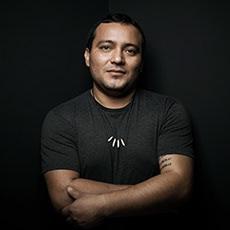
|
DENILSON BANIWA Originally from Barcelos, nestled in the heart of Amazonas, Denilson Baniwa is a member of the Baniwa indigenous community. Currently residing and working in Niterói, Rio de Janeiro, he is a passionate advocate for indigenous rights. Since 2015, Denilson has been actively engaged in delivering lectures, workshops, and courses, primarily focusing on the southern and southeastern regions of Brazil, as well as Bahia. In 2018, he curated the exhibition “Terra Brasilis: agro não é pop!” at the Art Gallery of Universidade Federal Fluminense in Niterói, as part of the “Brazil: A Margem” project initiated by the university. That same year, Denilson participated in the artistic residency of the fourth edition of the Corpus Urbis Festival held in Oiapoque, Amapá. His work has been featured in exhibitions at prestigious venues such as CCBB, Pinacoteca de São Paulo, CCSP, Centro de Artes Helio Oiticica, Museu Afro Brasil, MASP, MAR, and the Sydney Biennial. Beyond his role as a visual artist, Denilson is also an advertiser and a key figure in articulating digital culture and hacking, contributing significantly to the construction of indigenous imagery across various media platforms including magazines, films, and TV series. His contributions were acknowledged in 2019 when he won the Pipa Prize in the online category, and in 2021, he was honored as one of the winners nominated by the jury. |
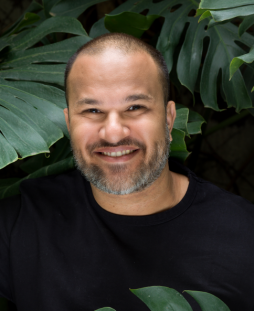
|
FLÁVIO CERQUEIRA Based in São Paulo, Brazil, he is currently pursuing a PhD in Visual Arts at Universidade Estadual Paulista-UNESP. His artistic practice revolves around traditional bronze casting techniques, with a focus on the human figure as the central theme of his poetic expression. His work intricately weaves together personal, historical, and at times fictional narratives to explore complex issues of class, identity, race, and gender. By incorporating everyday objects such as mirrors, books, traffic signs, or graffiti writing, he creates a dynamic interplay between these elements and the larger-than-life bronze human figures, blurring the boundaries between sculpture, architectural space, and viewer. Cerqueira employs sculpture as a means to capture fleeting moments, freezing fragments of actions in time, inviting the viewer to engage as co-authors in the interpretation of multiple narrative possibilities. His art has been featured in numerous group exhibitions both in Brazil and internationally, notably including Histórias Afro Atlânticas at the National Gallery of Washington (2022), The Museum of Fine Arts Houston (2021), and MASP in São Paulo, Brazil (2018). Other significant exhibitions include Queermuseu at Santander Cultural in Porto Alegre, Brazil (2017), South/South Let me Begin again at Goodman Gallery in Cape Town, South Africa (2017), the 10th Mercosul Biennial in Porto Alegre, Brazil (2015), and Resignification at the Stefano Bardini Museum in Florence, Italy (2015). His works are housed in prestigious collections across Brazil, including Instituto Inhotim, Museu de Arte de São Paulo Assis Chateaubriand (MASP), Pinacoteca do Estado de São Paulo, Museu Afro Brasil, Museu de Arte Contemporânea da Universidade de São Paulo (MAC-USP), and the Rio Grande do Sul Art Museum (MARGS), among others. |
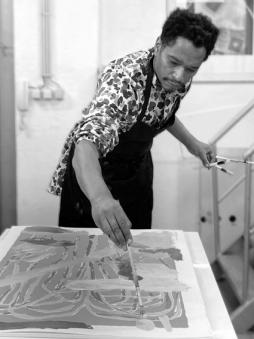
|
FRANCISCO VIDAL Having graduated in Fine Arts from the Escola Superior de Artes e Design das Caldas da Rainha, he furthered his studies with an advanced course in Visual Arts at the Escola de Artes Visuais Maumaus in Lisbon. He spent a period living in the United States, where he earned a Master's in Fine Arts from the School of Visual Arts at Columbia University in New York. He commenced exhibiting regularly in 2005. In 2014, he showcased the painting project "Utopia Luanda Machine" at the 56th Venice Biennale, representing the Angola Pavilion curated by António Ole, and at Expo Milano, curated by Suzana Sousa. In 2016, he exhibited the "ESCOLA DE PAPEL" project in Luanda, followed by a presentation in São Tomé and Príncipe in 2017. Francisco Vidal's artistic practice revolves around themes of labor and international mobility. He is renowned for his expansive painting installations, characterized by powerful calligraphic lines on screen printing canvases, utilizing vibrant colors and diverse chromatic schemes. His works are held in esteemed national collections such as those of the EDP Foundation, Calouste Gulbenkian Foundation, and Cachola Foundation, as well as in international collections. |
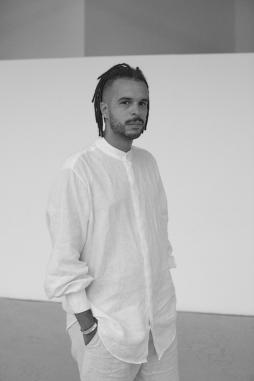 |
HÉLIO MENEZES Hélio Menezes is a multifaceted anthropologist and internationalist, engaging as a curator, critic, and researcher. Notably, he curated the 35th São Paulo Arts Biennial, titled “Choreographies of the Impossible” in 2023. His tenure as the curator of Contemporary Art and Literature at Centro Cultural São Paulo from 2019 to 2021 marked a significant contribution to the cultural landscape. Additionally, he served as the international coordinator of the World Social Forum in Belém (2009), Dakar (2011), and Tunis (2013), showcasing his dedication to global dialogue and collaboration. Educationally, Hélio holds both a master's and doctoral degree from the University of São Paulo and is an Affiliated Scholar at the Brazil Lab at Princeton University. He has enriched his academic journey with experiences at the Institut d’ Etudes Politiques de Paris (Sciences-Po, 2007) and the Universidad Autónoma de Madrid (UAM, 2013). His recent curatorial endeavors encompass a diverse array of exhibitions, including "Carolina Maria de Jesus: A Brazil for Brazilians" at IMS, "Voices against Racism," "Abre-Caminhos" at CCSP, "The Discovery of What It Means to Be Brazilian" at Mariane Ibrahim Gallery in Chicago, and "There Is Light Behind the Walls," a permanent exhibition at the Osório Cesar Art Museum. Noteworthy projects also include "Jota Mombaça: Crossing the Great Night Without Lighting the Light" at CCSP, "Afro-Atlantic Stories" at MASP/Instituto Tomie Ohtake, and contributions to the 30th and 31st editions of the CCSP Exhibition Program, as well as the Nova República exhibition at the São Paulo Architecture Biennial. His written works are featured in various publications, including catalogs for exhibitions such as "Histórias Afro-Atlânticas" (volumes 1 and 2), the 10th Berlin Biennale for Contemporary Art, "Rubem Valentim: Atlantic Constructions" at MASP, and "Prison to Prison: An Intimate Story Between Two Architectures" at the Venice Architecture Biennale. In 2021, Hélio Menezes was acknowledged by ArtReview magazine as one of the 100 most influential figures in contemporary art worldwide, underscoring his significant impact and ongoing contributions to the field. |
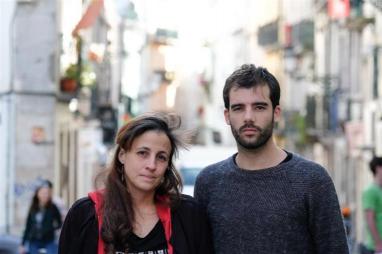
|
JOÃO SALAVIZA + RENÉE NADER MESSORA Renée Nader Messora, born in São Paulo in 1979, holds a degree in Cinematography from the Universidad del Cine in Buenos Aires. With over fifteen years of experience as an assistant director in Brazil, Argentina, and Portugal, she has cultivated a deep understanding of the cinematic craft. In 2009, Renée Nader Messora crossed paths with the Krahô indigenous people, an encounter that proved transformative. Since then, she has immersed herself in the community, actively participating in the mobilization of a local collective of Krahô filmmakers. Her cinematic endeavors are driven by a commitment to using film as a vehicle for self-determination and the preservation of cultural identity. "Rain is Singing in the Village of the Dead" marks her directorial debut, showcasing her profound dedication to storytelling and cultural representation. |
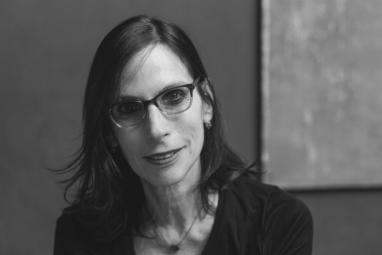
|
LILIA MORITZ SCHWARCZ Anthropologist, historian, and professor in the Department of Anthropology at the University of São Paulo, she also serves as a Global Scholar at Princeton University. Her academic journey includes stints as a Visiting Professor at esteemed institutions such as Oxford, Leiden, Brown, and Columbia. Additionally, she has contributed as a guest curator at the São Paulo Museum of Art and as a columnist for the newspaper Nexo. Her notable achievements include being named a John Simon Guggenheim Foundation Fellow in 2007 and receiving the Commendation of the National Order of Scientific Merit in 2010. Renowned for her prolific scholarship, she has authored a diverse bibliography, including acclaimed works such as "Portrait in White and Black" (1987, recipient of the APCA award), "The Spectacle of the Races" (1993), "As Barbas do Emperor" (1998, winner of the Jabuti Book of the Year award), "O Sol do Brasil" (2008, recipient of the Jabuti Prize in the biography category in 2009), "Brazil: A Biography" (with Heloisa Murgel Starling, 2015), and "Lima Barreto: Triste Visionário" (2017, winner of the Jabuti Biography prize). |
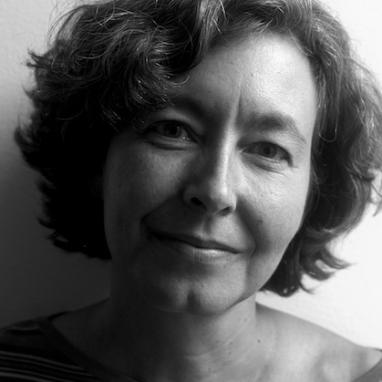
|
MARGARIDA CARDOSO Director and screenwriter, she also serves as a professor for the Cinema, Video, and Multimedia Communication course at Lusófona University of Lisbon. From 1982 to 1995, she worked extensively as an assistant director, annotator, and set photographer on over 50 Portuguese and international films. Since 1995, she has ventured into both fiction and documentary filmmaking, solidifying her position as one of the most respected figures in Portuguese cinema. Her documentaries, including "Natal 71" and "Kuxa Kanema – The Birth of Cinema," along with her fiction films "A Costa dos Murmúrios" and "Yvone Kane," stand as notable works in her portfolio. These films delve into themes that intertwine her personal experiences with pivotal moments in Portuguese history, such as the colonial war in Africa, the revolution, and the end of the colonial era. |
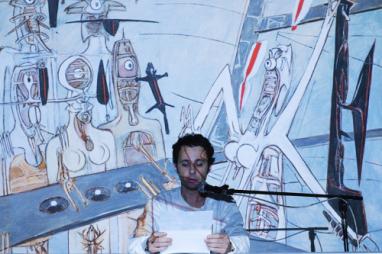
|
PEDRO BARATEIRO Trained in drawing, sculpture, video, and writing, he furthered his education with a master's degree from the Malmö Art Academy at Lund University (Sweden) and the Independent Study Program in Visual Arts at Maumaus – School of Visual Arts (Lisbon). His artistic development also flourished through residencies at Air Antwerpen (Antwerp), Pavillon – Palais de Tokyo (Paris), ISCP (New York), Sítio das Artes, CAM – Fundação Calouste Gulbenkian (Lisbon), Spike Island (Bristol), and Galeria Zé dos Bois (Lisbon). His solo exhibitions have been showcased at prestigious venues worldwide, including Netwerk (Aalst), Basement Roma (Rome), Neon (Lyon), REDCAT (Los Angeles), Berardo Collection Museum (Lisbon), Kettle’s Yard (Cambridge), Parkour (Lisbon), Kunsthalle Lissabon (Lisbon), Kunsthalle Basel, Lumiar Cité (Lisbon), Serralves Museum of Contemporary Art (Porto), MARCO – Vigo Contemporary Art Museum, White Pavilion – City Museum (Lisbon), and Spike Island (Bristol). |
